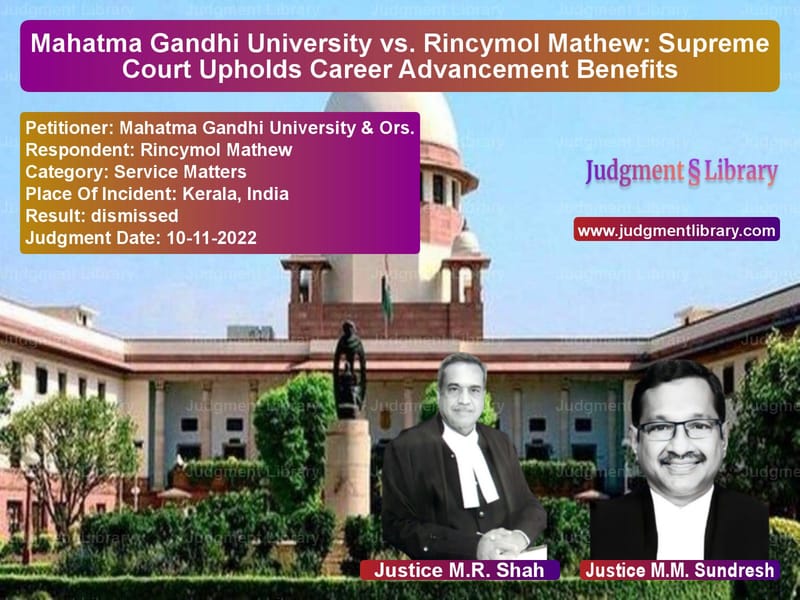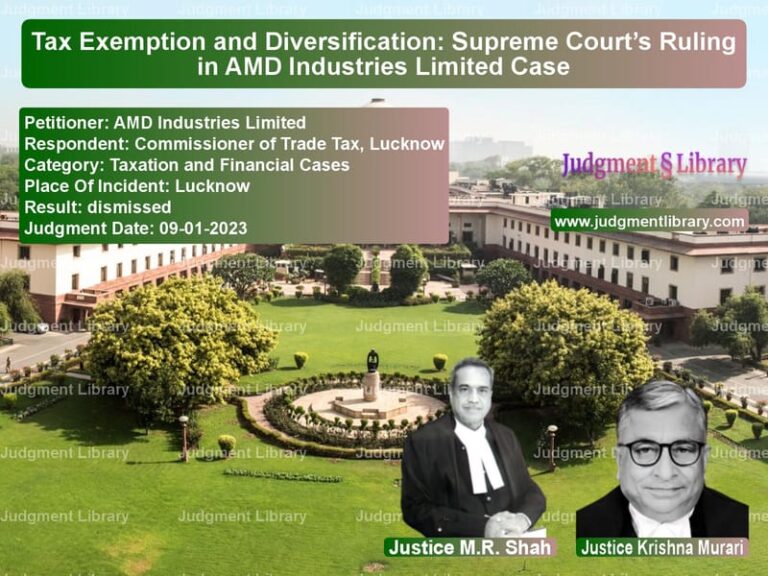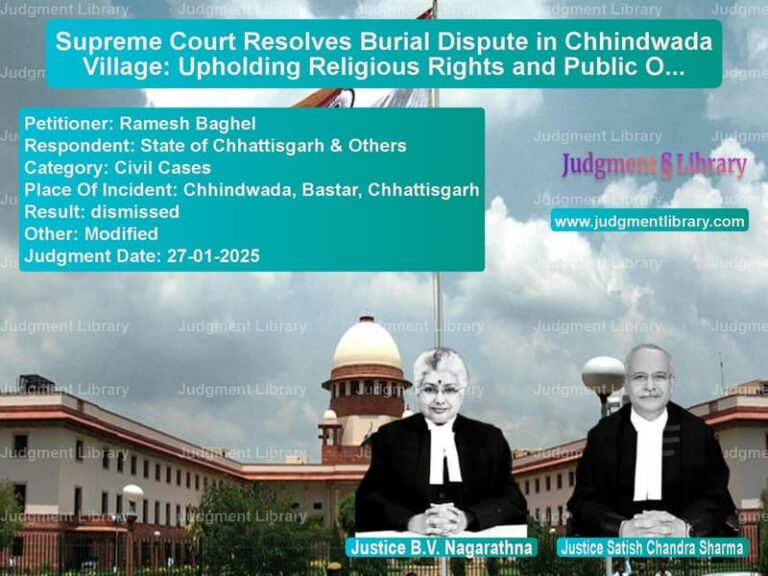Mahatma Gandhi University vs. Rincymol Mathew: Supreme Court Upholds Career Advancement Benefits
The Supreme Court of India has delivered a crucial verdict in the case of Mahatma Gandhi University vs. Rincymol Mathew, reinforcing the principles of career advancement for educators in universities. The dispute revolved around whether an assistant professor’s past service in a self-financing institution under the university could be counted for the Career Advancement Scheme (CAS) under University Grants Commission (UGC) regulations. The Supreme Court upheld the Kerala High Court’s ruling, directing the university to count the respondent’s past service for promotion and benefits under CAS.
This ruling has significant implications for faculty members across Indian universities, clarifying that past service, even in self-financed institutions, cannot be arbitrarily disregarded if the selection process adhered to standard procedures.
Background of the Case
The case originated from a service dispute involving Rincymol Mathew, who initially joined the School of Medical Education under Mahatma Gandhi University as a Lecturer on October 3, 1998. Over the years, she progressed through various academic positions:
- Assistant Professor (February 6, 2001 – October 11, 2004)
- Associate Professor (October 4, 2004 – April 11, 2005)
- Professor in Nursing (April 12, 2005 – January 20, 2011)
- Assistant Professor, School of Behavioural Sciences (January 21, 2011 – Present)
The university initially granted her career advancement benefits, considering her past service, but later revoked this decision. The Vice-Chancellor, exercising powers under Section 10(17) of the Mahatma Gandhi University Act, 1985, determined that her initial appointment was irregular and not duly sanctioned under university statutes, thereby denying her the CAS benefits.
Feeling aggrieved, Rincymol Mathew approached the Kerala High Court, which ruled in her favor, directing the university to restore the benefits. The university appealed to the Supreme Court.
Arguments by the Parties
Petitioner (Mahatma Gandhi University)
- Argued that Regulation 10.1 of UGC guidelines allows counting of past service only if the appointment was made against a sanctioned post through a formal selection process.
- Claimed that the respondent’s initial appointment was in a self-financing institution and not through regular recruitment procedures.
- Contended that previous service in an institution operating under a different funding model cannot be considered for CAS.
Respondent (Rincymol Mathew)
- Submitted that her appointment was made after a selection process conducted by the university and approved by the Vice-Chancellor.
- Argued that her probation was duly confirmed and she continued serving in the same institution under regular pay scales.
- Highlighted that she was promoted to higher positions based on merit, making her service eligible under CAS.
Observations by the Supreme Court
The Supreme Court analyzed the case in light of UGC Regulation 10.1, which governs CAS eligibility. Key observations included:
- The term “previous regular service” should be interpreted holistically and not restricted to appointments under specific funding structures.
- The respondent was appointed through a legitimate selection process and had served continuously for over a decade before the dispute arose.
- There was no break in her service, fulfilling the continuity requirement under CAS regulations.
- The university’s argument that self-financing appointments could not be considered was rejected, as the institution operated under the university’s administrative control.
The Court quoted:
“When the respondent worked continuously right from 1998, initially as Lecturer, and was subsequently promoted in the regular pay scale, her regular service should be counted for CAS benefits.”
Judicial Precedents Cited
The Court relied on several landmark judgments to reinforce its decision:
- State of Karnataka vs. Uma Devi: Addressed the validity of appointments and regularization in government service.
- University of Delhi vs. Raj Singh: Emphasized adherence to UGC norms in faculty appointments.
- All India Council for Technical Education vs. Surinder Kumar Dhawan: Affirmed the need to recognize service in autonomous institutions under a university.
Final Verdict
The Supreme Court dismissed the university’s appeal and upheld the Kerala High Court’s order. The directives included:
- The university must count the respondent’s service from October 3, 1998, to January 21, 2011, for CAS benefits.
- The benefits of promotion, pay fixation, and seniority must be restored.
- The Vice-Chancellor’s order revoking CAS benefits was declared void.
Impact of the Ruling
This decision establishes an important precedent for faculty members in Indian universities. Key takeaways include:
- Recognition of Past Service: Universities must count previous service if it meets procedural and qualification requirements.
- Fair Implementation of CAS: Arbitrary revocation of career benefits without legal justification is impermissible.
- Strengthening Faculty Rights: The ruling prevents discrimination against educators based on the funding model of their institution.
Conclusion
The Supreme Court’s decision reinforces the principle that faculty members cannot be denied career advancement benefits due to administrative technicalities. By upholding the Kerala High Court’s ruling, the Court has ensured fairness in service recognition, benefiting educators across India.
This judgment sets a clear precedent that universities must uphold procedural fairness and cannot arbitrarily deny career benefits to deserving faculty members.
Petitioner Name: Mahatma Gandhi University & Ors..Respondent Name: Rincymol Mathew.Judgment By: Justice M.R. Shah, Justice M.M. Sundresh.Place Of Incident: Kerala, India.Judgment Date: 10-11-2022.
Don’t miss out on the full details! Download the complete judgment in PDF format below and gain valuable insights instantly!
Download Judgment: mahatma-gandhi-unive-vs-rincymol-mathew-supreme-court-of-india-judgment-dated-10-11-2022.pdf
Directly Download Judgment: Directly download this Judgment
See all petitions in Employment Disputes
See all petitions in Promotion Cases
See all petitions in Recruitment Policies
See all petitions in Public Sector Employees
See all petitions in Judgment by Mukeshkumar Rasikbhai Shah
See all petitions in Judgment by M.M. Sundresh
See all petitions in dismissed
See all petitions in supreme court of India judgments November 2022
See all petitions in 2022 judgments
See all posts in Service Matters Category
See all allowed petitions in Service Matters Category
See all Dismissed petitions in Service Matters Category
See all partially allowed petitions in Service Matters Category







